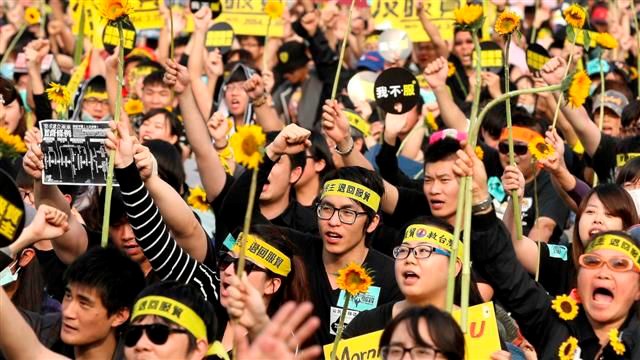A prominent activist asserts that Taiwan’s global standing underwent a significant transformation following the Sunflower student protests a decade ago. In that event, student demonstrators, concerned about Taiwan’s economic ties with China, occupied the national legislature for 23 days. Their primary aim was to thwart the Kuomintang’s efforts to approve a service trade deal with China. The protests, known as the Sunflower Movement, effectively halted the controversial Cross-Strait Service Trade Agreement (CSSTA).
“Until Sunflower, relations were determined by the KMT and CCP [Chinese Communist Party],” Lin Fei-fan, a prominent Sunflower protests leader, told Nikkei Asia in an interview. “Sunflower made Taiwan’s public realize that we have a say on our relationship with China and on our own future. Through the movement, we grabbed the power to set the narrative and decide our fate.”
Join us on Telegram: https://t.me/tfiglobal
Communist China has never governed Taiwan, a contemporary Asian democracy with a population of 23 million. However, China claims ownership of Taiwan and has not ruled out the possibility of a military intervention. The enduring impact of the Sunflower Movement is evident today, with the Kuomintang (KMT), advocating for closer ties with Beijing, experiencing defeat in its last three presidential election attempts. Despite this, the KMT secured the position of the largest party in the legislature during the January elections.
The Sunflower Movement’s influence extends to President Tsai Ing-wen’s significant victory in 2016. Furthermore, it played a crucial role in shaping Taiwan’s response to China’s actions in Hong Kong, generating widespread disapproval. This sentiment contributed to President Tsai’s remarkable re-election triumph in 2020.
“Sunflower marked a political awakening of Taiwan’s younger population. Before that we were seen as apolitical and were branded with the label ‘strawberry generation,’ meaning we were soft and unwilling to take part in politics,” Lin said.
“Sunflowers also drastically changed how the world saw the country. Just a month before the protests, [U.S. political scientist] John Mearsheimer published an article titled ‘Say Goodbye to Taiwan’ which focused on the idea that Taiwan’s prospects at that time weren’t good and we would eventually accept China’s terms into a political union,” Lin added.
Read More: Taiwan in Crisis: Chinese Coast Guard’s Move Sparks Panic
During KMT President Ma Ying-jeou’s tenure, the global expectation was that Taiwan would acquiesce to Chinese demands. Contrary to these expectations, the Taiwanese populace mobilized, leading to mass protests that significantly altered global perceptions of Taiwan.
The historical backdrop involves KMT strongman Chiang Kai-shek and his forces seeking refuge in Taiwan in 1949 to evade China’s communists. This relocation marked the commencement of the world’s second-longest period of martial law. In the subsequent decades, the Taiwanese population actively advocated for democratization and political reforms, engaging in persistent efforts to establish a more representative and participatory governance system.
In his recent publication, “Taiwan Unbound: A New Chapter,” seasoned publisher Rex How highlights the crucial period spanning the years before and after the Sunflower Movement. This timeframe coincided with the maturation of individuals born in 1987, the year martial law was lifted. At 35, Lin, a pivotal figure in the Sunflower Movement as a student leader, participated in various social movements, including the anti-media monopoly movement in 2012. Lin holds a master’s degree in comparative politics from the London School of Economics, and he joined the ruling Democratic Progressive Party (DPP) in 2019, assuming the role of deputy secretary-general. Presently, he serves as a board member of the DPP’s New Frontier Foundation think tank.
The aftermath of the Sunflower Movement marked a progressive era for Taiwan. It notably became the first Asian location to legalize same-sex marriage and adopted elements of ethical foreign policy, departing from its conventional approach. President Tsai officially apologized to Indigenous communities for historical mistreatment, a groundbreaking gesture unprecedented among heads of state.
Read More: Taiwan Minister Reports 5 Chinese Coast Guard Ships in Kinmen
Lin emphasizes that the generational divide in Taiwan, unlike Western countries, transcends typical identity and left-versus-right debates. Younger Taiwanese individuals tend to support gay rights and minority rights, demonstrating openness to discussions on topics such as cannabis legalization and the abolition of the death penalty, which are no longer deemed taboo. In contrast to the Democratic Progressive Party (DPP), both the Kuomintang (KMT) presidential nominee Hou Yu-ih and Taiwan People’s Party candidate Ko Wen-je expressed support for resuming talks on the Cross-Strait Service Trade Agreement (CSSTA) during their respective campaigns.
“The KMT and TPP presidential candidates still harbor an illusion of China’s economy and of Beijing’s economic statecraft. This illusion stems from their political ideology or naivety, namely if you support CSSTA you’ll be able to build trust with China,” Lin warned. “Doubling down on trade with China or seeking closer ties inevitably gives Beijing more bargaining chips to be used against Taiwan,” he added.
In the lead-up to Taiwan’s presidential election, China exhibited its economic influence by initiating an investigation into Foxconn founder Terry Gou, who had launched an independent bid. Additionally, China imposed import bans on Taiwanese products and partially suspended a significant trade agreement.
Amidst these developments, Lin, a prominent figure from Taiwan’s younger generation, offers a cautionary note. He advises his peers to contemplate a new and forward-looking agenda, emphasizing the importance of defining their stance by what they advocate for, rather than solely opposing existing frameworks.
“We need to go beyond responding to Chinese coercion, and work hard to resolve housing justice, minimum wage, social welfare and other domestic issues,” he said.
